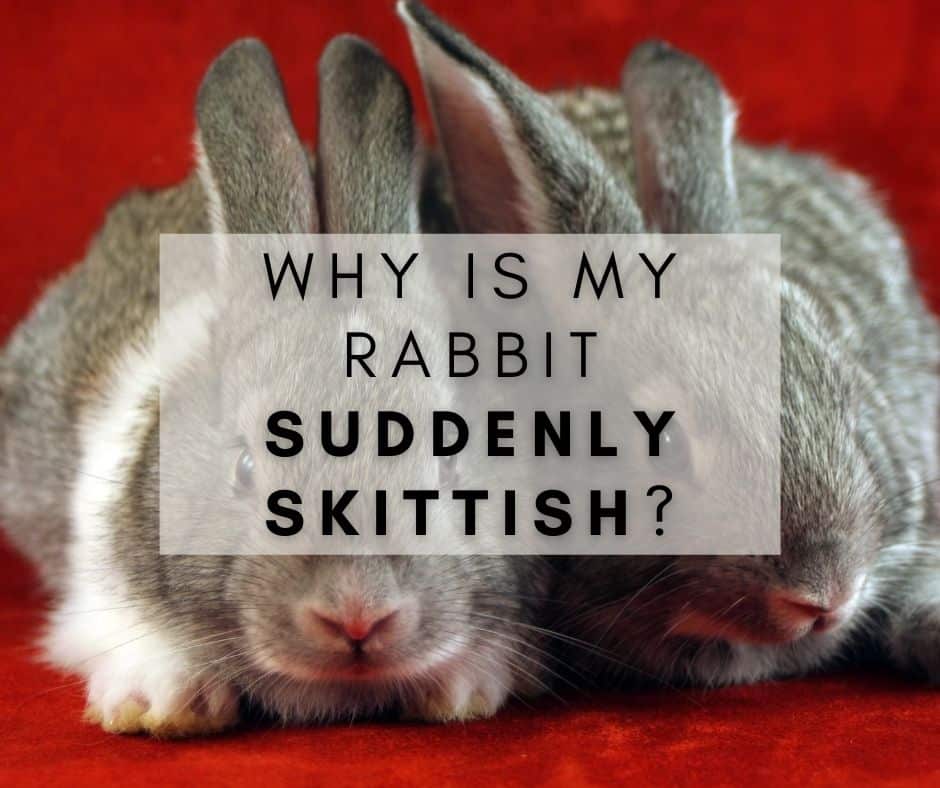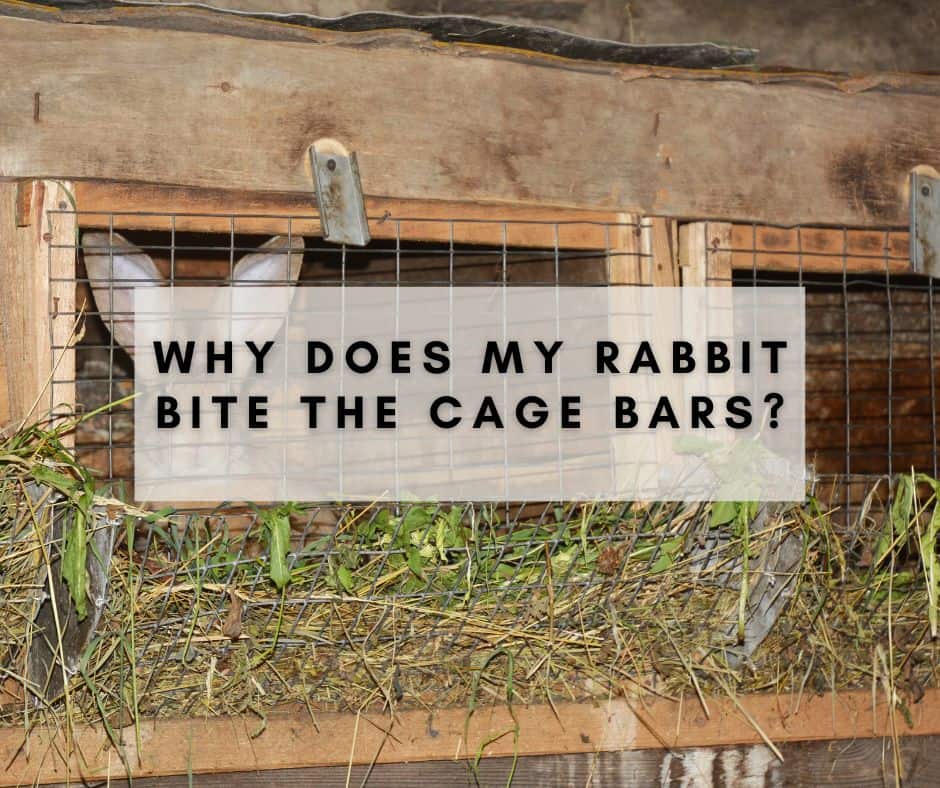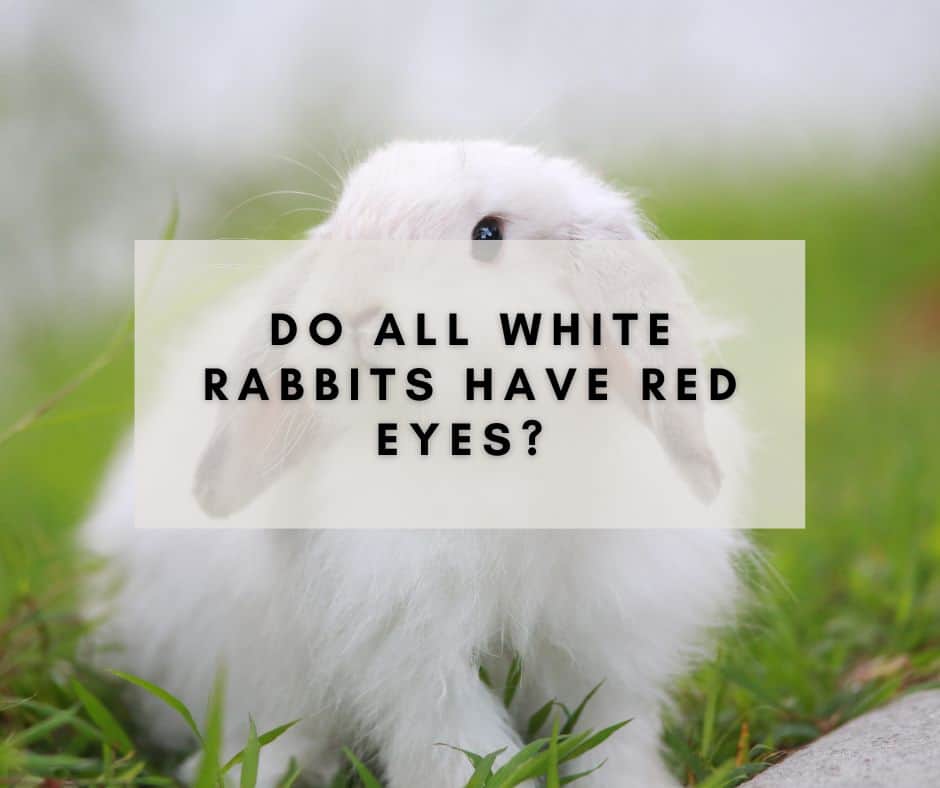
Your rabbit is just a small animal in a big world, so there is so much to be scared of, especially for prey animals. Although it’s not always obvious when bunnies are in distress, you can easily notice it from their behavior. So, why is your rabbit suddenly skittish?
Survival for rabbits in the wild depends on their ability to avoid predators using their senses and your bunny shares this same instinct. What primarily saves the rabbit from its natural habitat is its fear. It’s most likely it has noticed a sudden change in its immediate environment. This could be a new noise, smell, stress or it could also be a result of an illness.
It’s obvious that there could be multiple reasons why your rabbit is suddenly timid, fearful, and moving away from you. Just like when you visit a doctor, you may need to run a few tests and the doctor will ask you several questions as he tries to diagnose the cause of your health issue. You may have to understand the different things that scare a rabbit to know the one that applies to your bunny.
Contents
Common Reasons Why Your Rabbit is Suddenly Scared
One or more of the points here may apply to your rabbit, so take some time to reflect on its behavior or what happened before the sudden change in your rabbit’s behavior:
An illness
One of the reasons why your rabbit could run away from you is due to an illness it can no longer conceal from you. It could be a small wound that hurts, especially when you carry your rabbit in your hands. The good news is that once your rabbit heals, it will forget its fears quickly.
Stress
Rabbits also experience stress, especially the ones without a cage companion. You can easily tell if your rabbit is having symptoms of stress when it curls up in the cage with ears falling off and eyes looking blank. Some common causes of stress for rabbits include:
- A change in the location of their cage, a smaller cage or failure to take your rabbit out of the cage at the usual time.
- Failure to properly introduce a new cage companion to your rabbit.
- It could also be that you ignored your rabbit while it was trying to get your attention.
- A sudden drop in temperature or the air current could also be responsible for the change.
Lack of trust
Another reason why your rabbit may suddenly be skittish is that it no longer trusts you. This could be associated with something you did unknowingly. Although rabbits have different personalities, one thing they all have in common is that you must gain their confidence. But most importantly, you need to avoid losing their confidence especially when it’s something you need to do daily.
A Certain smell
To stay alive and away from predators, rabbits often depend on their sense of smell. They are extremely sensitive to strong odors since such smells saturate their muzzles and prevent them from being able to smell predators from a far distance. Your rabbit may not recognize you anymore if you put on a new perfume, use a conditioner, shampoo or chemical product for cleaning.
A Different noise
A major cause of the sudden change in behavior of your rabbit could be a new noise in your home or neighborhood from a fire truck or an ambulance. Of course, their long ears are not just there for fancy, they have a highly developed sense of hearing. In fact, in the natural habitat of rabbits, one of the things that save them from predators is their ear.
Complex personality
The complex nature of the rabbits’ personality could be the cause. They are known to adopt their owner’s emotional state. So, if you’re stressed and sad, your rabbit will most likely become sad and stressed once you sit with them. Your rabbit could also feel it when you’re scared of something and will move away from you too. Some experts believe that rabbits can feel the disease in people and other bunnies. So, if you have the flu, your rabbit may stay away from you.
How to Calm Down Your Skittish Rabbit
So, how can you deal with your skittish bunny, regain its trust and relate with it as you did before? The first thing you need to do is to identify the main cause or causes of the sudden fear and make sure you don’t repeat this mistake in the future. Here are other tips:
- Speak to your bunny with a reassuring voice and never shout at your rabbit. Make sure you allow your rabbit to come to you only when it’s ready. It is wrong to invade your rabbit’s space or compel it by attempting to pick or pet it without your rabbit coming to you and tilting its head forward. Some rabbits prefer being petted; others dislike it. Understand what your rabbit prefers and work with it.
- There should be no sudden movements or loud noise in your home. Provide good treats because one effective way of regaining a rabbit’s confidence is through food.
- Assume the same level with your rabbit – ground level. Lie on the floor while interacting with your bunny to prevent it from being intimidated by your size. Show your rabbit more of your face than your hands with your head touching its head since it is a sign of reconciliation and appeasement in their language.
- There should be no more future surprises for your Rabbits. Due to the position of your rabbit’s eyes, it would be hard to see you coming when you stand in front. So, always stand either on the left or right side of your rabbit.
- Avoid neglecting your Rabbit’s needs. Ensure that your rabbit’s hay and fresh water are always available in the cage. Make sure its cage and litter box are clean all the time.
- Understand your rabbit’s unique character. Avoid doing things your rabbit dislikes and remember, rabbits can get sad, jealous, and easily angry.
- Stressed and nervous rabbits respond positively to classical music. As much as possible, allow your rabbit to listen to classical music because it will help calm it down.
How to Prevent Your Rabbit from Being Scared
Some bunnies are not really as fearful as the others. But if you notice that your rabbit seems to be spooked easily, then you should take action. You can start with socialization which has to do with training animals to be familiar with human interactions. What this means for a rabbit is becoming free with being handled. It also includes getting used to new people, sudden movements as well as loud sounds. Socialization often takes place when they are between 4-6 weeks old.
Although you can still socialize older rabbits, it is often more difficult and not as effective as the younger ones. Another strategy is desensitization which has to do with exposing your bunnies to experiences they might perceive as threats. The purpose of desensitization is to help them learn that such experiences won’t be painful and they will eventually respond without fear when face with the situation.
Observe Your Rabbit’s Behavior
If you’ve discovered what made your bunny scared of you and made the necessary adjustments, your rabbit should be calm now. This is the time to keep an eye on your rabbit for the next few hours. Provide a few pets for your rabbit’s comfort and watch out for the signs of recovery and normal behavior. Also, observe your rabbit’s eating and litter habits for some hours because anxiety and fear often affect their digestion slightly.
Go back to your normal activities to help your rabbit return to a state of normalcy. Your bunny will continue to calm down as your home routine returns. But what happens if this doesn’t work?
If your bunny becomes unresponsive or fails to eat, then you may require the attention of a veterinarian. Take your rabbit to a vet immediately if your rabbit fails to eat in ten hours, especially when it refuses to eat its favorites.
Your rabbit may be in shock if it becomes unresponsive and fails to react when you touch it. Before getting into the car, wrap your bunny and call your vet since the car ride could further increase the stress level. Is it possible for rabbits to die of fear?
Yes, rabbits can die of fear due to heart failures caused by stress. Emotional stress is a common cause of arterial hypertension and hypotension in rabbits.
So, your rabbit is simply scared and that’s why it’s avoiding you. Once you have identified what frightened your rabbit, take action to calm it down. Give your scared rabbit some space, time, and a place to hide while working through its fears on its terms. Your bunny will be happier for it.



